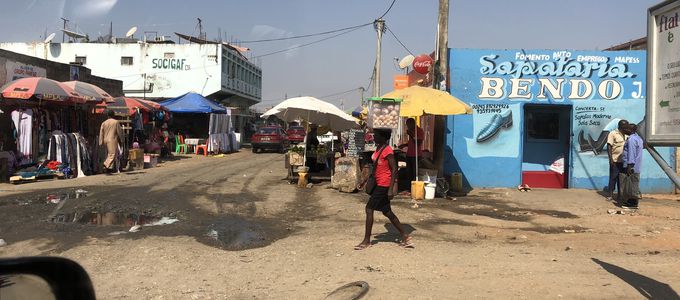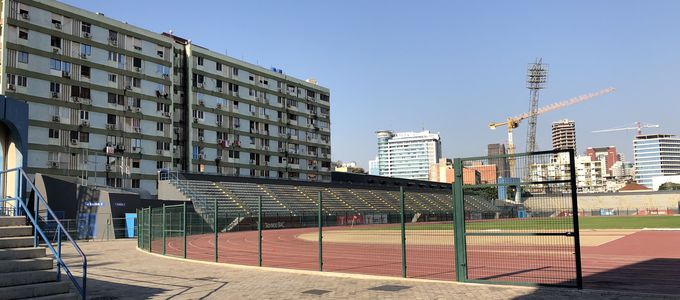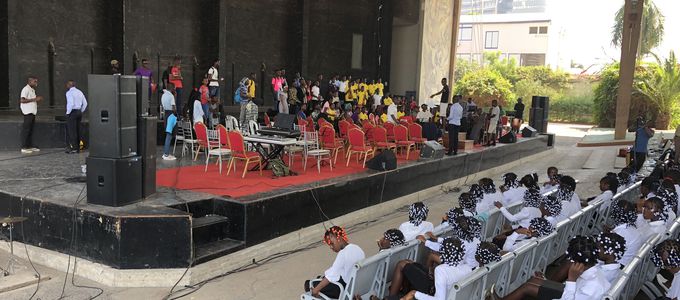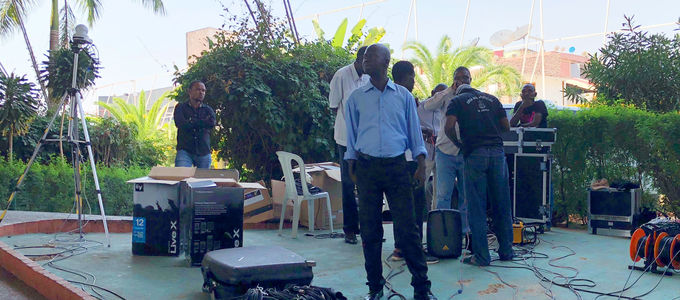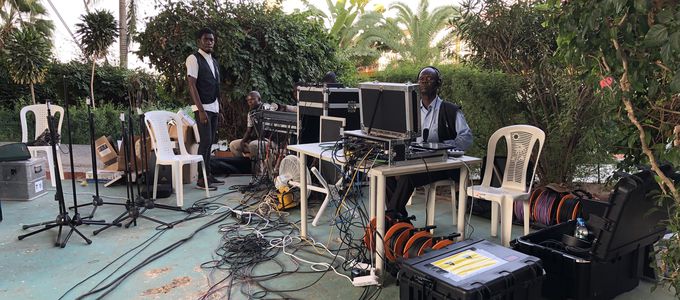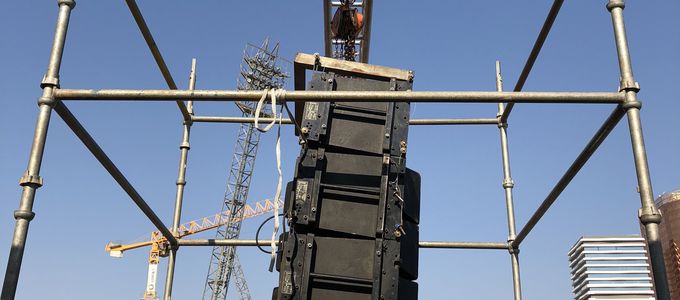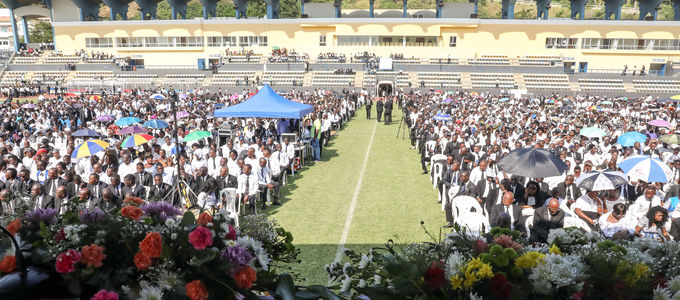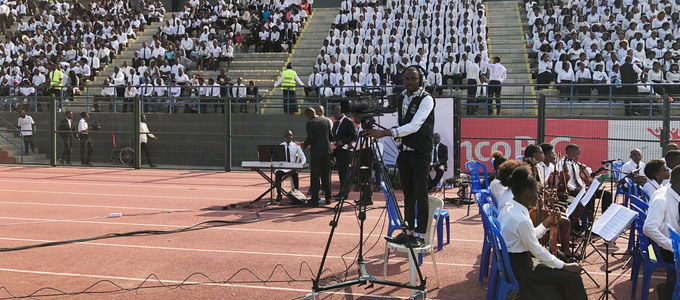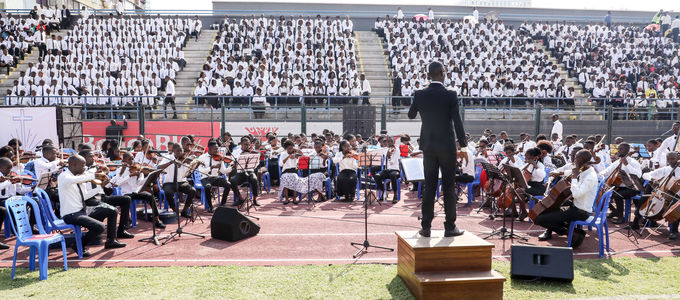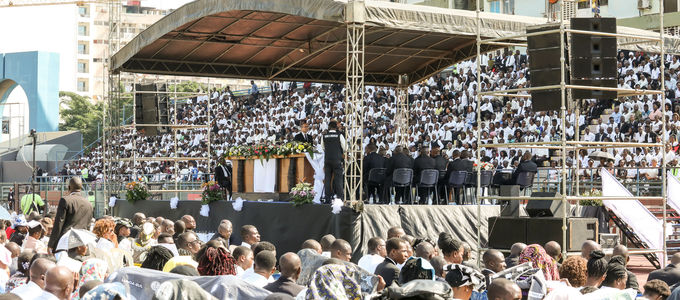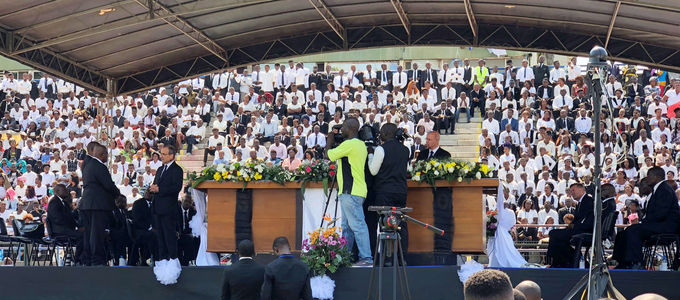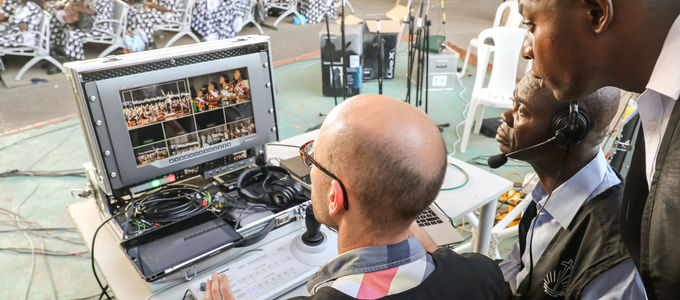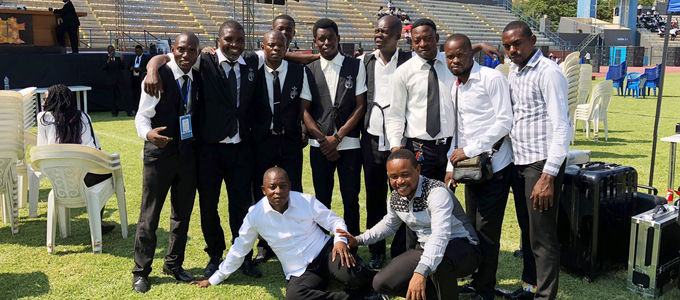
“Move closer! No, not with the camera. Zoom in,” Tim Schaefer-Rolffs prompts the cameraman with the black vest. But by then he had already started to make his way to the altar and was now standing directly in front of it.
Tim Schaefer-Rolffs works at the offices of the New Apostolic Church Western Germany. The 37-year-old Priest, husband, and father is responsible for IT systems administration and event technology in the District Church. His job often takes him into large churches and halls. In divine services, youth conventions, and other events in Germany he—along with other brothers and sisters—makes sure that there are sharp images and good quality sound.
A week in Africa
In the second week of June, Tim was sent on a special mission: for 184 hours and 20 minutes he lived and worked in Angola, 6,700 kilometres away from home. He co-ordinated the first transmission of a divine service in Angola via Internet Protocol Television, better known by its abbreviated form IPTV. The transmission via Internet had been planned because of the retirement of Apostles Manuel Eduardo Mbuta and José Ndombele Danu, two pioneers of the Church in Angola. Chief Apostle Jean-Luc Schneider retired the two long-serving Apostles in a divine service on Sunday, 10 June 2018. The service took place in a stadium with 23,000 people in attendance. Another 14,000 watched the live broadcast in 26 congregations across Angola.
Excess baggage: 250 kilos of technical equipment
First things first … packing for the trip to Angola. Some clothes and loads of technical equipment: seven large and four small suitcases are heaved onto the conveyor belt at the check-in desk. They contain two remote controlled cameras, one hand-held camera, hundreds of metres of cables, adapters—the list is long. Plus there is a “gift” for Tim’s colleagues: 50 new XLR cables for the OB team in Angola. Their old cables had become brittle and could no longer be used.
Team work on the playing field
In Angola, the two teams work together perfectly, both on a personal basis as well as technically: the OB team of the NAC in Angola is made up of eleven men. They are busy assembling their mixing desk, microphones and other equipment on the playing field. Tim has brought cameras, cables, and other equipment from Germany. An external company is busy mounting the heavy loudspeakers.
It took two attempts to mount the speakers properly, the German technician remembers. The speakers, each of which had been hung from high scaffolding towers, had not been positioned properly. “They had to be repositioned. In Europe, this would have caused a lot of grumbling, because everything would have had to come down and be reassembled,” he says, speaking from experience. In Luanda, however, ten men positioned themselves around the scaffolding and shook it until the speakers were in the right position. There you go! “One of them even had a helmet on,” Tim says, smiling at the idea of European safety regulations.
What does become a problem, however, is the pending delivery of some cameras that had been ordered. Three were to have arrived at the stadium on the Friday, with an HD-SDI or HDMI connection. In the end, only one camera was delivered—with an analogue interface. However, Schaefer-Rolffs lays cables for all six cameras that were planned and resumes with the test recording, hoping that the rest of the equipment will arrive on time.
IPTV transmission without Internet
To stream an IPTV transmission requires an upload speed of at least 1.5 megabits, Schaefer-Rolfs explains. When they measured the upload speed on Saturday afternoon, he noticed that there was only 0.4 megabits upload—not nearly enough for a video transmission. At the stadium’s reception desk, he checks the connection and discovers that in spite of having been assured that there is a fibre optic cable, there is only a simple coaxial cable. It is too late to change anything.
On Saturday evening, plan B was in place. The German technician set up his LTE-router, which he had brought along. A brother bought a compatible card in Luanda. Angola has a well-developed mobile communications network. But even the LTE-card that he was handed only supplied a modest 0.4 megabits upload. The card was bought, the data volume charged, but the registration by means of identity card was not completed. “Then I really started to sweat, not because of the heat, but because now we had a real problem,” Schaefer-Rolffs remembers. A local brother came to his aid. He works for a mobile phone company and offered him the use of his router and card: 20 megabits upload speed.
Assemble, disassemble, reassemble
A large stand-up fan has been tipped over and positioned next to the technical equipment. The blades of the fan purr softly as they rotate and provide some much-needed cool air for the OB equipment: the outside temperature is 36 degrees. Days later, Tim Schaefer-Rolffs still smiles about this and says: “Active cooling! They always do it this way!”
Late on Saturday evening, tension builds: the equipment has to be completely dismantled again. Day-time temperatures are hot and dry. At night, however, the temperatures drop to 10 degrees Celsius with a humidity factor of 70 per cent. It is so humid that the control table is covered in water the next morning. To ensure that nothing is damaged, the cameras are dismantled, cable reels are covered in plastic bags and sealed with tape to waterproof them … On Sunday morning, everything is reassembled. The situation is different in an open stadium than in a hall.
The last of the six cameras is delivered on Sunday morning, twenty minutes before the start of the service. The fact that this camera transmits the on-screen menu with the zoom factor and a reminder that the SD-card is missing—settings that could not be changed any more—does not bother him. “That’s just how it is.”
Can the camera man please show only the altar
During the service, Schaefer-Rolffs is at the controls of the video console and at the same handling two remote controlled cameras. He is also connected via intercom with other cameramen. Everything is going according to plan, until twenty minutes into the service the Chief Apostle suddenly interrupts his sermon and says, “Can the camera man please show only the altar, not the congregation.” A cameraman, who had been hired and had never before filmed a divine service, had moved over to where the brothers and sisters were sitting to capture some impressions and close-ups of people. An unusual situation, but quickly corrected.
Cheerful and dancing people
After the divine service, the brothers and sisters sing and dance in the stadium. The visitor from Germany is fascinated. Like many others, he holds up his smart phone to capture some impressions. Video evidence of joy!
“It was an adventure, but everything worked out fine,” Priest Schaefer-Rolffs sums up his week in Angola. Important, he says, is that you have a plan B and a plan C up your sleeve. This way you are prepared for any pitfalls or eventualities.
Early on Tuesday morning, Tim Schaefer-Rolffs arrives at Frankfurt International Airport. “Cheerful and relaxed members, and amazing experiences,” is how he sums up his impressions. He has also arrived at an insight: “Here in Europe, we sometimes really do some big-time whinging.”








